| | |||||||||||||
| |||||||||||||
| |||||||||||||
| |||||||||||||
The 1965 New Zealand Labour Party leadership election was held on 9 December 1965 to determine the future leadership of the New Zealand Labour Party. The election was won by Lyttelton MP Norman Kirk.
| | |||||||||||||
| |||||||||||||
| |||||||||||||
| |||||||||||||
The 1965 New Zealand Labour Party leadership election was held on 9 December 1965 to determine the future leadership of the New Zealand Labour Party. The election was won by Lyttelton MP Norman Kirk.
After Walter Nash retired as leader in 1963 Arnold Nordmeyer became Labour's sixth leader despite holding considerable public blame for Labour's loss of support after the Black Budget of 1958. [1] The memory of the "Black Budget" still plagued Nordmeyer's profile and many within the party believed that it was time for a fresh start. Many MPs in Labour felt Nordmeyer was unelectable as his previous performance as Minister of Finance represented a 'tax and hope' image which the party was keen to rectify. In early 1964 Kirk spoke to Nordmeyer to see if he intended to continue as party leader. Nordmeyer stated he did and was confident he would win the 1966 election and would appoint Kirk Minister of Industries and Commerce in the event of a Labour victory. Kirk thought this hypothetical posting to be insufficient and set his sights on the leadership, despite (according to Nordmeyer) promising he would not. [2] Some colleagues such as Henry May thought it best for Kirk to wait until after the 1966 election, believing Labour would lose regardless of who was leader. [3] Kirk ignored such advice and, as party president, strategically allowed full television coverage of the party's 1965 annual conference. It was the first occasion a political conference was televised and Kirk took full advantage and presented himself well on camera and made impressive speeches including deliberately straying in his 'state of the party' address to speak on foreign affairs and declare reasons why New Zealand should avoid participating in the Vietnam War. [4]
A group of younger Labour MPs formed a group who became dedicated to replace Nordmeyer with Kirk, becoming known as the "Mafia". The main supporters of Kirk were Bill Fox, Warren Freer and Mick Moohan who promoted him to others at gatherings. Moohan attempted to win over the President of the New Zealand Federation of Labour Tom Skinner, who was unconvinced. Skinner respected rather than liked Nordmeyer but thought a challenge being the end of his leadership was less dignified than he deserved and refused to help Kirk. [5] Freer, who supported Kirk but also felt affinity for Nordmeyer, asked his friend Phil Holloway (a Labour MP from 1954 to 1960) to inform Nordmeyer of Kirk's level of support. Freer hoped that if Nordmeyer was aware of the numbers he would not contest the leadership and save himself embarrassment. At a dinner with the Nordmeyers, Holloway informed them of the state of caucus loyalties. Nordmeyer was shocked to hear of Kirk's support but his wife, Frances, was cynical of the news and dismissed the information and assured that her husband had the numbers to win. [6]
By mid-1965 media were openly speculating a challenge for the leadership by Kirk. [7] In October Nordmeyer stated that a caucus meeting would be held in the second week of December to "provide an opportunity for discussing and voting on the leadership and deputy leadership" of the party. [8]
Nordmeyer had led Labour since Nash's retirement nearly three years earlier. He led them in the 1963 election where Labour's vote increased slightly, but still did not perform well enough to win office. Some within Labour's caucus were of the opinion that Nordmeyer was too distant and out of touch with his colleagues and vice versa. [9] Nordmeyer was credited for holding Labour factions together under his leadership with a closer liaison between the Labour movement's political and industrial wings, but the election loss and memory of the 1958 Budget counted against him. [10]
Kirk first entered parliament in 1957. Gradually, he began to rise through Labour's internal hierarchy, becoming vice-president of the Party in 1963 and president in 1964. [11] As president Kirk made a point of visiting the Labour Representation Committee in every electorate in the country and was apparently received very well. [7] Other MPs often saw Kirk as a champion for ordinary New Zealanders via his working-class background at a time when ordinary voters saw many other politicians, such as Nordmeyer, out-of-touch and aloof. [11] Kirk was seen as lacking in administrative experience as he was a backbencher in the previous Labour government and had not been a cabinet minister. [10]
A caucus vote was held on 9 December 1965 where Nordmeyer was defeated by Kirk 25 votes to 10. [1] Nordmeyer's deputy leader, Hugh Watt, retained his position despite the change in leadership receiving 24 votes against a combined total of 10 votes for the other two nominees. [12]
| Candidate | Votes | % | |
|---|---|---|---|
| Norman Kirk | 25 | 71.42 | |
| Arnold Nordmeyer | 10 | 28.58 | |
| Majority | 15 | 42.85 | |
| Turnout | 35 | — | |
| Candidate | Votes | % | |
|---|---|---|---|
| Hugh Watt | 24 | 70.58 | |
| Arthur Faulkner | 8 | 23.52 | |
| Norman Douglas | 2 | 5.88 | |
| Majority | 16 | 47.05 | |
| Turnout | 34 | — | |
A list of each MP's vote. [13] [14]
| MP | Leader Vote |
|---|---|
| Phil Amos | Kirk |
| Basil Arthur | Kirk |
| Ron Bailey | Kirk |
| Paddy Blanchfield | Kirk |
| Mick Connelly | Nordmeyer |
| Norman Douglas | Kirk |
| Jim Edwards | Nordmeyer |
| Arthur Faulkner | Kirk |
| Bill Fraser | Kirk |
| Warren Freer | Kirk |
| Martyn Finlay | Kirk |
| Bill Fox | Kirk |
| Mabel Howard | Kirk |
| Norman King | Kirk |
| Norman Kirk | Kirk |
| Ethel McMillan | Nordmeyer |
| Brian MacDonell | Kirk |
| Ritchie Macdonald | Kirk |
| Robert Macfarlane | Nordmeyer |
| Rex Mason | Nordmeyer |
| Jock Mathison | Nordmeyer |
| Henry May | Nordmeyer |
| Mick Moohan | Kirk |
| Colin Moyle | Kirk |
| Walter Nash | Kirk |
| Arnold Nordmeyer | Nordmeyer |
| Bill Rowling | Nordmeyer |
| Matiu Rata | Kirk |
| Iriaka Ratana | Kirk |
| George Spooner | Kirk |
| Eruera Tirikatene | Kirk |
| Bob Tizard | Kirk |
| Steve Watene | Kirk |
| Hugh Watt | Kirk |
| Stan Whitehead | Nordmeyer |
Kirk's new enthusiastic leadership brought about a gradual rejuvenation in Labour's popularity. He suffered narrow election losses in 1966 and 1969 elections before finally winning office and becoming Prime Minister in 1972 election. Nordmeyer remained in Parliament for another four years, moving to the backbenches and becoming an elder statesman of the party. He retired at the 1969 election. [1]
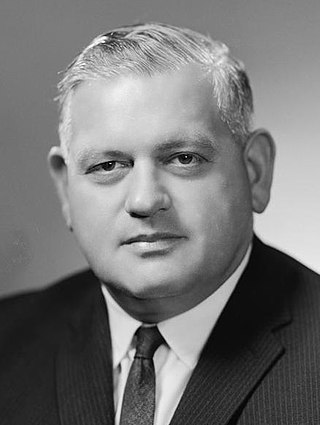
Norman Eric Kirk was a New Zealand politician who served as the 29th prime minister of New Zealand from 1972 until his sudden death in 1974.

Sir Arnold Henry Nordmeyer was a New Zealand politician and Presbyterian minister. As a member of Parliament (MP) he played a crucial role in the Labour Party, serving from 1935 to 1969. He served as minister of finance (1957–1960) and later as leader of the Labour Party and leader of the Opposition (1963–1965). Although he was a prominent statesman, Nordmeyer never ascended to the role of prime minister.

Sir Wallace Edward Rowling, commonly known as Bill Rowling, was a New Zealand politician who was the 30th prime minister of New Zealand from 1974 to 1975. He held office as the leader of the Labour Party.
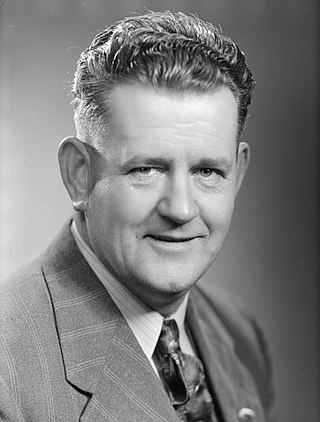
Hugh Watt was a New Zealand politician who was a Labour member of Parliament and the acting prime minister of New Zealand between 31 August and 6 September 1974, following the death of Prime Minister Norman Kirk. He had been the fifth deputy prime minister of New Zealand since 8 December 1972. Watt later served as high commissioner to the United Kingdom.

In New Zealand, the term Black Budget refers to the government budget of 26 June 1958, in which Minister of Finance Arnold Nordmeyer increased taxes on beer, tobacco, cars and petrol.

Michael Moohan was a New Zealand politician of the Labour Party. Seldom known to anyone by anything other than "Mick", he was a major organisational figure in the Labour Party's early history and went on to become a significant politician in his own right as an MP and cabinet minister.
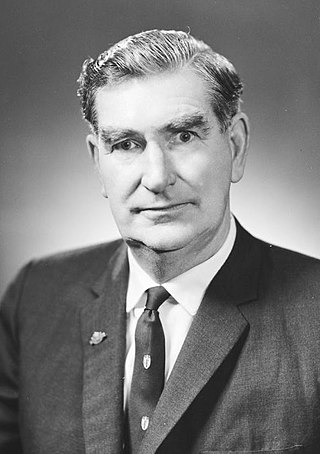
Michael Aynsley Connelly was a New Zealand politician of the Labour Party, and a Cabinet Minister from 1972 to 1975 in the Third Labour Government.

Warren Wilfred Freer was a New Zealand politician and member of the Labour Party. He represented the Mount Albert electorate from 1947 to 1981. He is internationally known as the first Western politician ever to visit the People's Republic of China.

Allan "Martyn" Finlay was a New Zealand lawyer and politician of the Labour Party. He was an MP in two separate spells and a member of two different governments, including being a minister in the latter where he reformed the country's justice system.

Arthur James Faulkner was a New Zealand politician of the Labour Party.
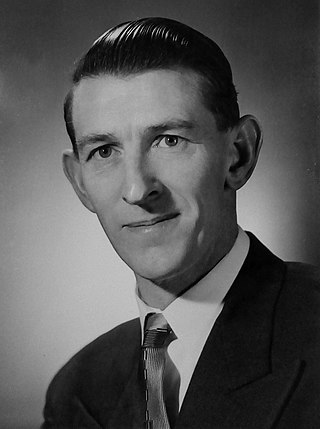
William Alex Fraser was a New Zealand politician of the Labour Party.

William Arthur Fox was a New Zealand politician of the Labour Party, and a Cabinet minister in the Second Labour Government of 1957–1960.
James Gladstone Edwards was a member of parliament for Napier, in the North Island of New Zealand.
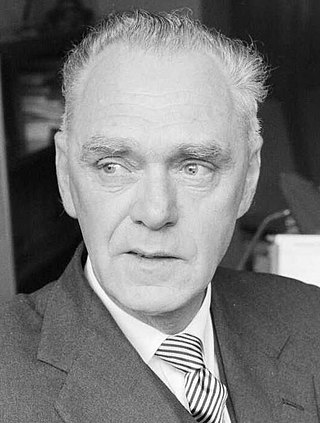
John Mathison was a New Zealand politician of the Labour Party. He was famed for his skills as a chairman and well known for his "unmistakably Scottish" accent, eloquent speeches and dry sense of humour.
The New Zealand Labour Party leadership election, 1940 was held on 4 April 1940 to choose the fourth leader of the New Zealand Labour Party. The election was won by Wellington Central MP Peter Fraser.

The 1974 New Zealand Labour Party leadership election was held on 6 September 1974 to determine the eighth leader of the New Zealand Labour Party. The election was won by Tasman MP Bill Rowling.

The 1951 New Zealand Labour Party leadership election was held on 17 January to choose the fifth leader of the New Zealand Labour Party. The election was won by Hutt MP and incumbent deputy-leader Walter Nash.

The 1954 New Zealand Labour Party leadership election was held on 23 June 1954 to determine the future leadership of the New Zealand Labour Party. The election was won by Hutt MP Walter Nash, the incumbent leader.

The 1963 New Zealand Labour Party leadership election was held on 26 February to choose the sixth leader of the New Zealand Labour Party. The election was won by Island Bay MP Arnold Nordmeyer.
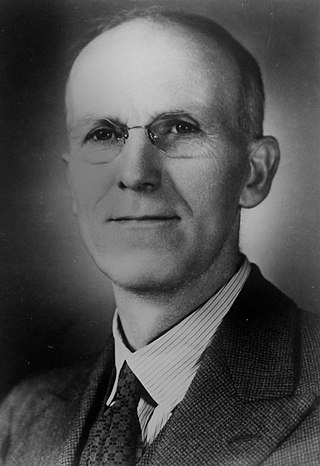
The Mason Affair was an event that transpired in New Zealand in the lead up to the 1966 election revolving around Labour Party MP Rex Mason and other septuagenarian MPs being pressured to retire.